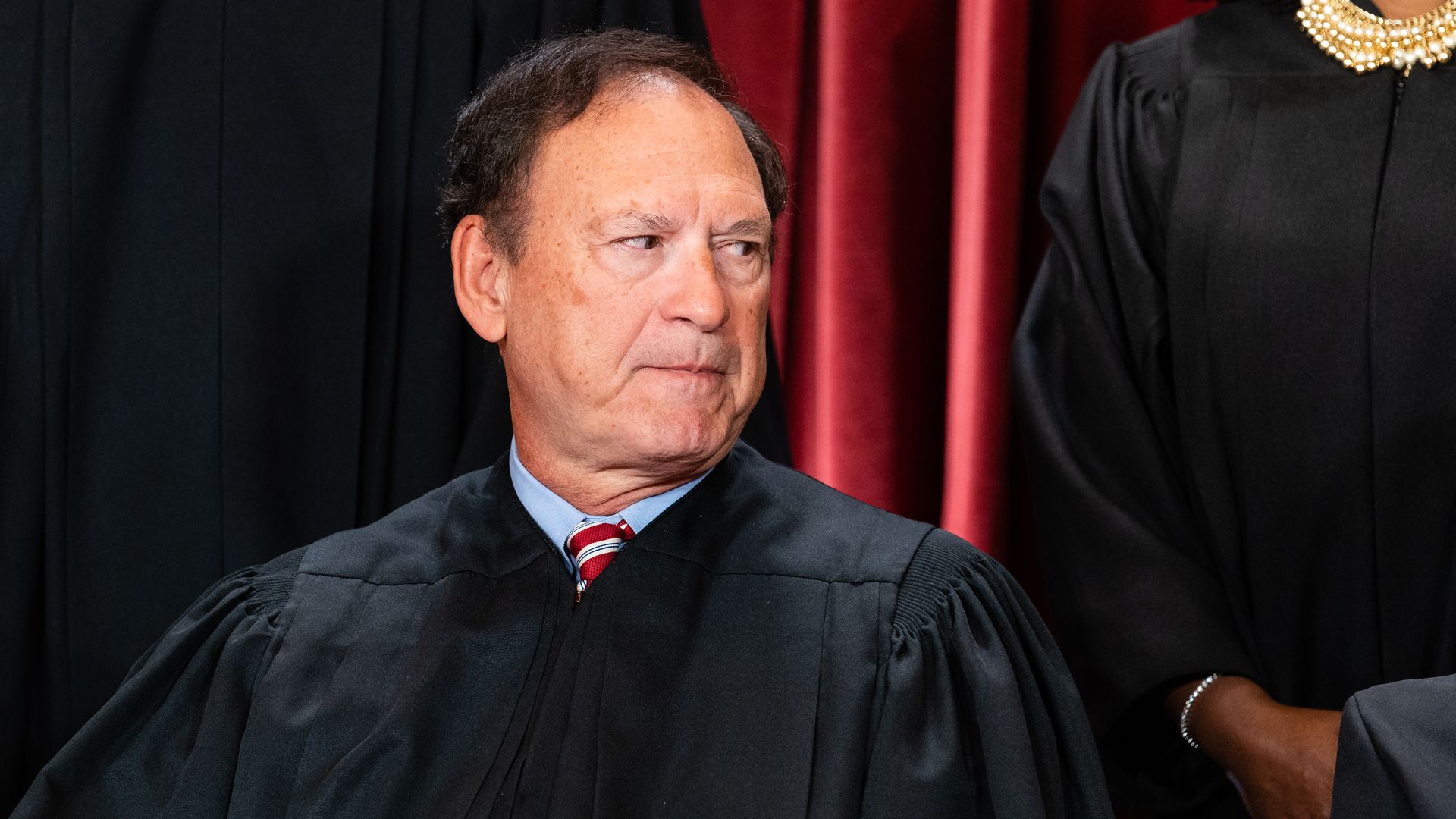Recently, there has been a controversy surrounding Democrats allegedly misusing flags to intimidate Justice Alito. This incident has sparked a debate about the appropriate use of symbols in political discourse and the boundaries of free speech. Some argue that the act of waving flags in a confrontational manner towards a Supreme Court justice is a form of intimidation and goes against the principles of respect and civility. Others believe that it is a legitimate form of protest and a way to express dissent towards a public figure.
It is important to consider the context in which this incident occurred and the motivations behind the actions of those involved. While freedom of speech is a fundamental right, it is also important to recognize the impact that certain actions may have on individuals and the implications for the broader political discourse. Ultimately, this controversy raises important questions about the limits of free speech and the responsibilities that come with exercising this right in a democratic society.

Understanding the Issue
Understanding the issue at hand requires a thorough examination of the various factors at play. It is essential to consider the historical context, societal norms, and cultural influences that have shaped the current situation. By delving into the root causes and underlying motivations, we can gain a deeper insight into the complexities of the issue.
Additionally, it is crucial to listen to the voices of those directly affected and consider their perspectives and experiences. This can provide valuable insights into the nuanced dynamics at play and help us develop a more comprehensive understanding of the issue. Furthermore, it is important to recognize that there are often multiple layers to any given issue, and a one-size-fits-all solution is rarely effective.
By taking a holistic approach and considering all the various facets of the issue, we can better understand the complexities and challenges involved. Ultimately, understanding the issue requires a willingness to engage in critical thinking, empathy, and open-mindedness. Only by approaching the issue with an open heart and mind can we hope to truly comprehend its intricacies and work towards meaningful solutions.
The Role of Flags in Political Discourse: Historical Context and Modern Implications
Flags have long played a significant role in political discourse, both in historical contexts and in modern times. Throughout history, flags have been used as symbols of unity, identity, and power by various political entities. They have been used to represent nations, states, and political ideologies, serving as visual representations of values and beliefs.
Flags have also been used as tools of propaganda, with political leaders using them to rally support for their causes and ideologies. In modern times, flags continue to play a crucial role in political discourse, with politicians and political movements using them to assert their authority, promote their agendas, and mobilize their supporters. Flags are often displayed at political rallies, demonstrations, and events, serving as powerful symbols that can evoke strong emotions and sentiments among the populace.
Additionally, flags are used in international relations to represent nations and their interests, with diplomatic disputes often centering around the display and treatment of flags. In conclusion, flags are more than just pieces of cloth fluttering in the wind; they are powerful symbols that hold immense political significance and can shape the course of history.

How Political Symbols Are Used to Influence Public Opinion
Political symbols are powerful tools used by politicians and activists to shape public opinion and rally support for their causes. These symbols can take many forms, from flags and national anthems to slogans and logos. By associating these symbols with their political messages, individuals can tap into deep-seated emotions and beliefs to sway public opinion in their favor. For example, politicians often use flags to evoke feelings of patriotism and unity, while activists may use symbols of resistance to inspire defiance and solidarity.
Additionally, symbols can serve as a shorthand for complex ideas or ideologies, making it easier for politicians to communicate their message to the public in a memorable and impactful way. Ultimately, the use of political symbols is a strategic tool that can help shape public perception and influence the outcomes of elections, policy debates, and social movements. Whether used subtly or overtly, these symbols have the power to evoke strong emotions and shape public opinion in ways that can have far-reaching implications for society.
As such, it is important for individuals to be aware of how political symbols are being used and to critically evaluate their meaning and implications in order to make informed decisions about their beliefs and actions. By understanding the power of political symbols, individuals can better navigate the complex landscape of politics and make decisions that are in line with their values and beliefs.
The Influence of Symbolic Politics on Democratic Processes
Symbolic politics plays a significant role in shaping democratic processes by influencing public opinion and policy decisions. Symbols such as flags, slogans, and gestures are often used by political leaders to mobilize support and convey messages to the public. These symbols can evoke strong emotions and create a sense of unity among citizens, fostering a sense of belonging and identity within a political community.
Additionally, symbolic politics can be used to communicate values and ideals that are important to a society, shaping the direction of public policy and government actions. However, the use of symbols in politics can also be divisive, creating polarization and reinforcing existing social divisions. For example, symbols that are associated with a particular group or ideology can alienate those who do not identify with them, leading to further political fragmentation.
Moreover, the manipulation of symbols for political gain can undermine trust in democratic institutions and erode the legitimacy of the political system. In this way, symbolic politics can have a profound impact on the functioning of democracy, shaping the way in which citizens engage with their government and participate in the political process. It is essential for political leaders to be mindful of the power of symbols and to use them responsibly in order to promote a more inclusive and participatory democratic system.

Fostering Respectful Political Engagement: Moving Beyond Symbolic Intimidation
Fostering respectful political engagement requires moving beyond mere symbolic intimidation tactics. It is important for individuals to engage in meaningful and constructive dialogue with one another, even when opinions differ. This can be accomplished through active listening, empathy, and a willingness to engage in thoughtful discussions that seek to understand different perspectives. By focusing on building relationships and understanding one another’s viewpoints, individuals can create a more respectful and inclusive political environment.
This approach allows for the exchange of ideas and promotes a culture of mutual respect and understanding. It is crucial for individuals to recognize the importance of respectful political engagement in order to foster a healthy and productive political discourse. By moving beyond symbolic intimidation tactics and instead focusing on respectful dialogue and understanding, individuals can work towards creating a more inclusive and harmonious political landscape.
Ultimately, fostering respectful political engagement requires a commitment to open-mindedness, empathy, and a willingness to engage in constructive conversations with others, even when faced with differing opinions. This approach can help to bridge divides, build relationships, and create a more positive and respectful political environment for all members of society.
